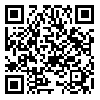Volume 22, Issue 3 (Jul- Aug 2014)
JSSU 2014, 22(3): 1299-1303 |
Back to browse issues page
Download citation:
BibTeX | RIS | EndNote | Medlars | ProCite | Reference Manager | RefWorks
Send citation to:



BibTeX | RIS | EndNote | Medlars | ProCite | Reference Manager | RefWorks
Send citation to:
Moghimi M, Nabieian M, Zarmahi S. Schwannoma of the Parotid Gland: A Case Report. JSSU 2014; 22 (3) :1299-1303
URL: http://jssu.ssu.ac.ir/article-1-2672-en.html
URL: http://jssu.ssu.ac.ir/article-1-2672-en.html
Abstract: (10943 Views)
Introduction: Schwannoma is an uncommon benign neoplasm which in is found in head and neck in 25-48% of the cases. This tumor arises from Schwann cells and nerve sheath and asymptomatic swelling is the chief complaint of this tumor. Although aspiration is performed for such cases, the nature of tumor can be defined only after histopathologic examination. In fact, Schwannoma diagnosis is difficult before the surgical procedure.
Medical History: The case was a 24-year-old female who had a mass at the anterior of the left ear for three years. She did not have spontaneous pain. The lesion was mobile and painful in deep palpation. CT with contrast was performed for the patient which showed left parotid enlargement and a hypodense mass in the middle. Fine-needle aspiration biopsy (FNA) revealed pleomorphic adenoma. The patient underwent a superficial lobe parotidectomy. Microscopic examination showed parotid schwannoma with cystic changes.
Conclusion: Parotid gland is an uncommon location for schwannoma. There are no pathognomonic visual findings for this lesion. Only 17.6% of the reported parotid schwannomas have been diagnosed before the surgical procedure. FNA is not a reliable procedure for tumor diagnosis, because in most of the cases it shows benign tumor of salivary gland i.e. pleomorphic adenoma. The nature of these tumors can be defined only after histopathologic examination. Since in histopathology of pleomorphic adenoma, myoepithelial cells were seen as schwannoma-like fusiform cells, immunohistochemistry was also performed to make sure of the diagnosis. In this method, CK and S100 markers in order to stain, which CK demonstrated negative result and S100 reported positive results, thus confirming the diagnosis of schwannoma.
Type of Study: case report |
Subject:
Pathology
Received: 2014/01/5 | Accepted: 2014/07/9 | Published: 2014/08/3
Received: 2014/01/5 | Accepted: 2014/07/9 | Published: 2014/08/3
Send email to the article author
| Rights and permissions | |
 |
This work is licensed under a Creative Commons Attribution-NonCommercial 4.0 International License. |





